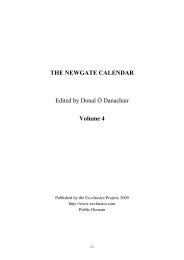PDF format (1.55 Mb) - The Ex-Classics Web Site
PDF format (1.55 Mb) - The Ex-Classics Web Site
PDF format (1.55 Mb) - The Ex-Classics Web Site
Create successful ePaper yourself
Turn your PDF publications into a flip-book with our unique Google optimized e-Paper software.
THE ANATOMY OF MELANCHOLY<br />
MEMB. II. Retention and Evacuation rectified.<br />
I have declared in the causes what harm costiveness hath done in procuring this disease;<br />
if it be so noxious, the opposite must needs be good, or mean at least, as indeed it is, and to this<br />
cure necessarily required; maxime conducit, saith Montaltus, cap. 27. it very much avails.<br />
Altomarus, cap. 7, "commends walking in a morning, into some fair green pleasant fields, but by<br />
all means first, by art or nature, he will have these ordinary excrements evacuated." Piso calls it,<br />
Beneficium ventris, the benefit, help or pleasure of the belly, for it doth much ease it. Laurentius,<br />
cap. 8, Crato, consil. 21. l. 2. prescribes it once a day at least: where nature is defective, art must<br />
supply, by those lenitive electuaries, suppositories, condite prunes, turpentine, clysters, as shall<br />
be shown. Prosper Calenus, lib. de atra bile, commends clysters in hypochondriacal melancholy,<br />
still to be used as occasion serves; Peter Cnemander in a consultation of his pro hypocondriaco,<br />
will have his patient continually loose, and to that end sets down there many forms of potions<br />
and clysters. Mercurialis, consil. 88. if this benefit come not of its own accord, prescribes<br />
clysters in the first place: so doth Montanus, consil. 24. consil. 31 et 229. he commends<br />
turpentine to that purpose: the same he ingeminates, consil. 230. for an Italian abbot. 'Tis very<br />
good to wash his hands and face often, to shift his clothes, to have fair linen about him, to be<br />
decently and comely attired, for sordes vitiant, nastiness defiles and dejects any man that is so<br />
voluntarily, or compelled by want, it dulleth the spirits.<br />
Baths are either artificial or natural, both have their special uses in this malady, and as<br />
Alexander supposeth, lib. 1. cap. 16. yield as speedy a remedy as any other physic whatsoever.<br />
Aetius would have them daily used, assidua balnea, Tetra. 2. sect. 2. c. 9. Galen cracks how<br />
many several cures he hath performed in this kind by use of baths alone, and Rufus pills,<br />
moistening them which are otherwise dry. Rhasis makes it a principal cure, Tota cura sit in<br />
humectando, to bathe and afterwards anoint with oil. Jason Pratensis, Laurentius, cap. 8. and<br />
Montanus set down their peculiar forms of artificial baths. Crato, consil. 17. lib. 2. commends<br />
mallows, camomile, violets, borage to be boiled in it, and sometimes fair water alone, and in his<br />
following counsel, Balneum aquæ dulcis solum sæpissime profuisse compertum habemus. So<br />
doth Fuchsius, lib. 1. cap. 33. Frisimelica, 2. consil. 42. in Trincavelius. Some beside herbs<br />
prescribe a ram's head and other things to be boiled. Fernelius, consil. 44. will have them used<br />
ten or twelve days together; to which he must enter fasting, and so continue in a temperate heat,<br />
and after that frictions all over the body. Lelius Aegubinus, consil. 142. and Christoph. Aererus,<br />
in a consultation of his, hold once or twice a week sufficient to bathe, the "water to be warm, not<br />
hot, for fear of sweating." Felix Plater, observ. lib. 1. for a melancholy lawyer, "will have lotions<br />
of the head still joined to these baths, with a lee wherein capital herbs have been boiled."<br />
Laurentius speaks of baths of milk, which I find approved by many others. And still after bath,<br />
the body to be anointed with oil of bitter almonds, of violets, new or fresh butter, capon's grease,<br />
especially the backbone, and then lotions of the head, embrocations, &c. <strong>The</strong>se kinds of baths<br />
have been in former times much frequented, and diversely varied, and are still in general use in<br />
those eastern countries. <strong>The</strong> Romans had their public baths very sumptuous and stupend, as those<br />
-34-
















